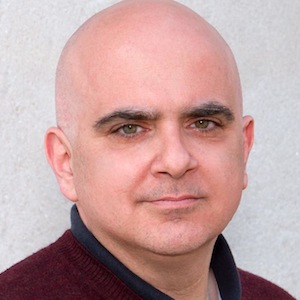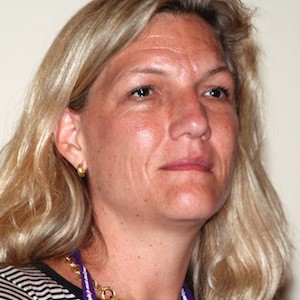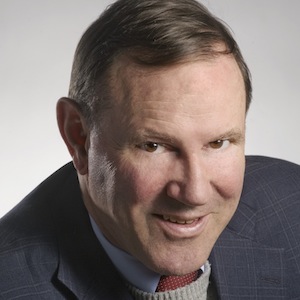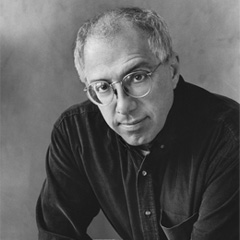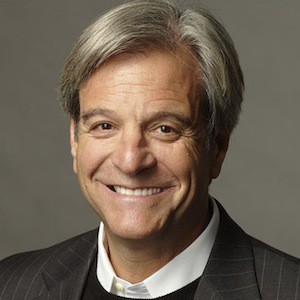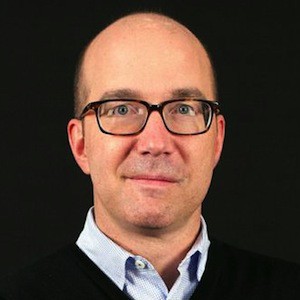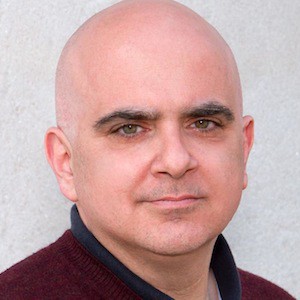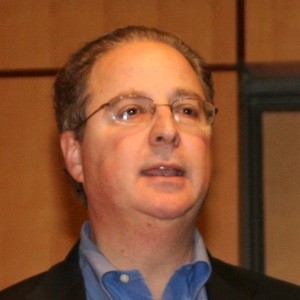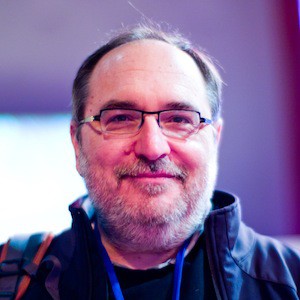Martin: OK, we’re here in Washington on April 4, 2013 with Chris Schroeder. Chris, why don’t you start by giving us just a 5 to 10 minute history of your experience with when you had the first realization that journalism and the Internet were coming together and colliding.
Chris: Well colliding, or, I think, complement each other at the time. It’s just depending on how you think back on it overall. But I was of the generation where I can remember being in business school, the first students started using Prodigy. At first, my reaction to it was why in god’s name would anybody be using anything like this? Then also you stop and you look at it and you play with it a little bit and you say, “Oh my god, for the first time in my life I’ve got the opportunity to see any piece of information anywhere at any given time.”
I was a very heavy user of AOL and some of the other things that came out at that point. Again, you asked yourself, with all the complexities that existed then of telephone access and that kind of a thing, you really began to pull on a thread and say to yourself, what would the world be like if you could actually get access to anything at any time, just because it’s there at your fingertips overall.
I was always a big news consumer. I’d worked in the government, I’ve known many reporters and editors and it was part of my daily experience. I’m also old enough to have read six newspapers every morning, that kind of a thing. But to have this epiphany where at some point, somehow you knew you were you were going to be able to get anything at your fingertips at any time, I think, was the clear revolution.
Martin: And when was that? What year?
Chris: 1992 was probably the first time I saw Prodigy. AOL obviously came five years later, whatever it was. Then I joined the Washington Post Company around 1996 or 1997, I can’t remember. They had a B2B business that had news as a part of it.
Martin: ’96 or ’97?
Chris: Yeah.
Martin: OK.
Chris. Yeah. Because what I could tell you is, at the time, the company that I ran before WashingtonPost.com was a company called Legislate which was a B2B online service for regulation and information. Part of the competitive edge was they put a lot of human beings to it to fix it. But they also had a news service.
But literally the year that I started with it was the year that Thomas was launched. Where they put literally all of the documents for free. In many respects I was also on the front lines of what it means to run a business. We were getting $1500 to $5000 a client or whatever it was, and all of a sudden half of what we offered was now available for free.
I had a really big epiphany, not only what it meant in terms of the ramifications of having access to the information the way I was describing it before, but also what it could mean to a business if you’re thinking about what makes you unique or distinct when people have so many alternatives at your fingertips.
Martin: Great. Then you arrived at the Post when?
Chris: The company Legislate was ’96, and that was probably when, I was starting business development…Let me think about this for a second. So I did business development for the Washington Post at first around ’96. I guess I took over Legislate maybe ’98. I guess that makes sense.
Martin: And the Post owned Legislate.
Chris: They owned a large chunk of Legislate, yeah.
Martin: Yeah, OK. When did you start working for Washington Post Newsweek Interactive?
Chris: We sold Legislate in two parts to Congressional Quarterly here in town and to a company that did state business overall. This was right before the bubble blew. My instincts are my wife and I were ready to go out to California, this was the time to do it. But at this point is was the early days of having WashingtonPost.com and Newsweek.com on the Internet as opposed to the exchange and these closed systems that have been tried before. There were very, very early days, very little revenue. Alan Spoon and Don Graham called me in after the sale of Legislate and said this is an interesting time where we need a lot of new thinking. You’ve just been on the front line of a vision of this. Would you like to help us figure it out?
Martin: OK, so the Post went live on the web in ’96, I think. I guess Ralph Turkowitz was running something called Digital Ink?
Chris: Digital Ink was originally and I think right before Ralph’s time was a, they had a partnership with AT&T Digital. I don’t know if you guys have done this as well, Martin, but it was more of a closed system kind of thing. Ralph I think was really responsible for not only pushing people to think about getting on the web but helping to put it there.
Martin: Right. Alan talked about that era quite extensively. So then Alan brings you in to run WPNI.
Chris: ’99.
Martin: What exists at that point?
Chris: It was a little bit of chaos at that point. In the environment of the Internet, generally speaking, were people putting a lot of resources to things. We must have been 4 or 500 people. It was a large cost structure that we had. We were in a bit of a tizzy, because you guys were talking about going public, with your own division at that time. So there was a lot of understanding, “What are these guys going to be like when they have resources? What are they going to be like when they have access to equity, which means that they can hire a different kind of a talent pool?” Within us, there was a very interesting two fold strategic challenge that was being wrestled all over the map, culturally as much as substantively.
The first was, should we be a newspaper online or focus on the news online, from The Washington Post side of it? Or should be “the great local portal,” almost the AOL of local? Could we bring together everybody within the Washington market to come into one place? We would help run it and raise it and be a definitive one stop shop. This was a very big strategic debate, with a lot of emotion, as you can imagine, around it.
The second one was Newsweek. Newsweek.com was a very interesting site, was the larger of the two sites. Obviously had a national, international, audience. But the connection between The Washington Post newspaper and Newsweek, as a magazine, was not a well oiled machine, shall we say. [laughs] The cultural issues there were profound. What ended up happening, frankly, is I stepped in. I inherited a business development thing in process. We ended up partnering with MSNBC for Newsweek.
Martin: One of the first things I remember in talking to you was, you were particularly unhappy, and others were as well but you were the most vocal, about the AP. One of the things that we’ve found is that this notion of the wires going direct to consumers, through Yahoo News, in particular, but in other contexts as well. Excite, others. Really disrupted the natural order of things. The AP, which had been formed by newspapers, was now, in a sense, competing with them. Can you talk about what you were thinking then?
Chris: There’s no question, I had a view of it at the time. I don’t remember. It’s interesting that you remember one of our first exchanges about it. There were two kinds of things that were going on at the time. In a lot of respects, honestly Martin, this may be thinking in hindsight. But at the time, I do believe I still felt that there were two things that were going to happen at some point.
And we needed to think about how we were going to participate and what might be inevitable. I don’t know if you remember. There was this company of incredibly smart guys, out on the west coast. It was a company called Octopus, or something. But there was a group that was effectively doing what Twitter became. Not in terms of micro blogging, but in terms of being able, for any of us, to find any article from any place at any time, overall.
Most of us who looked at it at this time said, “Oh my God. I don’t want to be on the same page at The New York Times. I don’t want people choosing The New York Times.” All of us had a mentality that said, “The Washington Post is The Washington Post. The New York Times is The New York Times. We’ll duke it out in the market. We’ll help each other in any way we can. But the idea that users can control it…”
This was one thing that was very troubling. As a complement to that, and within the context of this, here is AP, who we all pay for, we all funded this thing. It was there to be a service for us. All of a sudden, it was going to be, effectively, a platform of taking out the breaking side of the news aspect, in particular, of what we had. To me, it was the resources of being able to aggregate breaking stuff.
Because I knew quite early one, and it’s obviously proven out, that breaking news is a commodity. If you remember, I pushed very early for video. This would be a wonderful resource of basic video, for which we could do value add and make it more interesting. But in these early days, in particular, when we were getting our sea legs, the idea that the very group we were effectively funding and it was supposed to be the resource to us, building some direct to consumer platform at the time, I didn’t quite understand why that made sense.
Paul: But at the same time, Reuters went and just licensed. Because they didn’t have the co op constraints that AP did. So they and Yahoo really unleashed this.
Chris: And again, I don’t think this is revisionist history to say. I had a series of very early epiphanies, very quickly when I came to Washington Post, as I’m sure you did, Martin, at The New York Times, with what you were doing at The Times as well. Which is that breaking news was going to be a commodity. One of the crystal clear things was, the tragic things, like the planes hitting the towers. The idea that I’d beat The New York Times on that was irrelevant. Within seconds, it was going to be up. Reuters, of course, plays in that. You knew what was coming. The question was more of a sense of navigation, of how it should fit in, who should be doing what to whom.
Paul: But you thought, if that became table stakes, then you could differentiate and still win somehow?
Chris: To take it a step further, I felt that there would be no way to win without differentiating. If you did not have a core sense of what dynamic is, it’s a wonderfully powerful question and I think it’s still very poignant today. At one point, you had to say to yourself, if breaking news, as an example, which used to be the coin of the realm, in many respects, in the newspaper era, was now becoming something you had to do, then you had to ask yourself not only what were you doing unique, value added, or some kind of perspective that you had before.
But all of us found that we were competing, this was a very tough cultural thing, with good enough. I used to have this debate all the time with the guys. For all intents and purposes, there’s nothing like Bob Woodward reporting on the White House. But honestly, there are lots of people now reporting on the White House. He might have that extra thing.
There may be one thing that’s interesting about it. But the idea that it’s always that much better than so many other things that are coming, it would bristle you. I’m sure you saw this at the The New York Times. There’s a sense, at The New York Times, that, “We are The New York Times. We are the definer of quality.” There was some cultural feeling that, “You are the Washington Post. You are the definer of quality.” In many respects, that could be true. In many respects, I think it arguably was true. But in many respects, it was becoming less and less true. When the good enough, in fact, was viewed by people as good enough.
Paul: So the audience really did vote that they didn’t care about a lot better than good enough?
Chris: It depended on what audience you were talking about and to what kind of given issues. I can remember, as an example, in the couple of hours after September 11th, people cared a tremendous amount of what was right or what was wrong. So in that instance, as a contextual aspect of breaking news, that mattered a great deal. People again, weren’t thinking, and I don’t think, think now, “Would I pay more or less for it?” But they certainly put a value on it. People want to know what’s really going on. The idea that we were the arbiters of truth, or the sole arbiters of truth, of course, was clearly not the case quite early.
Martin: Let’s continue with the history. You guys decided to create this separate operation. Were you looking at us? Did you just decide to do that early? I can’t remember, Chris. Can you go through when WPNI was created over in Arlington?
Chris: Yes. By the time I got there, that ship had sailed. It struck me as a no brainer. Candidly, I would not have considered joining it had that not been done.
Martin: Why?
Chris: Because it was very clear to me, and it was very forward thinking of Don and your guys also to think about this, that something so new is happening that would be not only interesting and require a certain sense of looking at the world differently for what it was. But in many respects, was going to have to wrestle existing cultures, existing business models and existing criteria.
I’d had this experience in Legislate and other things. There’s a tremendous amount of cultural weight around the great institution of our newspapers. At one level, being off over there meant that you were almost making that more so. But that trade off, as compared to having the ability to run very quickly, to think differently about stuff, try to get the shuttle diplomacy right when you had to, I think, was paramount. We would have been dead in the water otherwise.
Martin: You went much further then we did, creating your own newsroom.
Chris: We did.
Martin: Why don’t you talk about creating your own newsroom, when you have 600 people at The Washington Post.
Chris: It’s a little bit like, “What do you mean by ‘is’?” We had a newsroom, but the newsroom was not, with the exception of videography, doing a lot of unique reporting. I should say that again. Videography and some of the entertainment stuff. There was a view that, in particular with younger audiences and new people doing new things in Washington, we could contribute to the cause. The idea that there was somebody at The Washington Post covering the White House and we had somebody covering the White House was not the case. There was not a whole lot of duplication.
Martin: OK. That’s an important clarification.
Chris: Yeah, it’s very important to understand it. One of the first things that I did when I got there, which was controversial at the time and I have to tell you that, in many respects, it was a paean to the challenges we’re talking about. I elevated Doug Fever to be the editor of the newspaper. Doug was a wonderful guy and worked very hard, but has, among other things, absolutely unquestioned newspaper editorial chops and confidence.
So that is, to the degree that we would experiment in things that were outside the parameters of the classic newspaper reporting, people knew that this was going to be OK with Doug. Because not only was he going to be a great communicator with them, but that he had unquestioned instincts about what it was we were going to do.
Martin: Did you ever question the free model, at that point? Or was it just simply a given in your mind?
Chris: Absolute given.
Martin: Why?
Chris: Because I felt, at the time, that as we were getting our sea legs in an environment of free, and to the thing we were talking about before about being good enough. We needed to hone in what was going to be our unique value proposition before we had any chance of building an enterprise that people would pay for.
The idea that, because we were The Washington Post or because The Washington Post could charge, by the way, 25 cents they were proud of for 30 years. The idea that in that environment we would want to clip the wings of our growth was something that I was deeply concerned about. I don’t know if you remember this, but one of the first times you and I were on a panel, someone had turned to you and said, “Would you ever consider charging?”
Even at that time, you’d said, “We’re wrestling with all sorts of different things. We should think about it.” I turned to you and smiled. I said, “I think The New York Times is so good, you should charge $1000 a person. You should just do that. $10,000, Martin. Go for it.” Because I wanted to take everything else in the mean time. And I obviously was being tongue in cheek. But it illustrates a little bit what my view was at the time.
Martin: In retrospect, clearly whatever we were doing at The Times and whatever you were doing at The Post led to very interesting businesses. But they’re not huge. They’re not at the scale of some of the really meaningful businesses on the Internet. We have this metaphor called the swimmers and the tide. There’s the tide, which is the tide of technology and companies. And the swimmers are the people who are making the decisions. My question for you is that, in retrospect, thinking about your own experience, because you had a separate operation and a separate team, did you go far enough, in trying to innovate? Or do you feel that you did everything you could have done?
Chris: No. Not even close. Are you kidding? Jesus Christ. Did you?
Martin: I’ll do this a separate interview.
Chris: [laughs] You can ask them, dear God no. There was a cultural view and a resource view. A lot of people talk, in reflection, about how much money operations like yours and mine burned over periods of time and this kind of thing. But the point of fact is, compared to the great technology companies, overall, and the quality of talent, we didn’t spend an angstrom of what they did.
What happens is, you get into this funny circle. I can remember, candidly, a repeated pissing match, there’s no other way to call it, with a lovely guy otherwise. Who was running business development in The Post. He kept coming to me. He said, “We are not a technology company. We will never be a technology company. We will never attract technology capabilities. Let’s focus on what we do well.”
My reaction then was my reaction now, “There’s something to that.” We know that there’s some things that should be core. We should think about our differentiation. But dear God, it’s not going to be long before we’re all going to say that we’re all technology companies. If we’re going to simply step back and say, “We’re going to concede this to the rest of the world and not think about innovation, for its sake,” we will be prescribed by definition to be a small business.
The argument I used to make to the board of directors is, “That’s fine.” We became $100 million plus revenue business, more profitable than other, larger enterprises. But is that what you want to do? Is that the way you want to think about it? Is that the way you want to think about it? Is that your ambition? In a lot of respects this becomes a cultural discussion as much as it becomes an execution or deployment of resources discussion.
Martin: It was interesting because I think the most important statement that Eric Schmidt made when we interviewed him was that innovation was not happening at the same level in the traditional businesses, whether they are newspapers or broadcasters or whomever…
Chris: Anything.
Martin: I’m not picking on newspapers here,. Because they just lack engineers. That engineers are the engines of innovation on the web.
Chris: And you couldn’t attract the caliber of engineers, even if you were wiling to. And what I would say to you in complement to that, and this is true not only of the news businesses you say, but it’s a cultural thing. The lack of engineers or the attraction of engineers is a decision that is transcendental to that tactical observation. To put it in another way, think about it for a second, how many companies could any of us name right now could literally stare themselves in the mirror and say, “The core of our business, the way we’re doing it now, is going to go away. It could be a year from now. It could be 10 years from now. Doesn’t matter.”
How many businesses have pivoted from that realization with all the cultural ramifications and everything else? Candidly, I can think of two. IBM at one point said, “Seventy two percent of our revenue is in mainframes, and within 18 months, or whatever it was, we’re going to get out of 72 percent of our revenue.” But in the history of American businesses, Intel did probably the same. How many?
Martin: That’s an even more radical one, getting out of memory.
Chris: How many? I can’t name a whole lot. So this conundrum…
Martin: Reed Hastings, in a more current incarnation.
Chris: Yeah, OK. That’s a good one. I agree with that. But the point I am making is a broader one, which is we wrestled that conundrum at a cultural level as much as in an execution level. The not thinking as yourself as innovator, forget even as a technology company. Not thinking of yourself and putting a value on innovation and, in fact, even believing you will be out innovated by others and you need to figure out how to play in those ecosystems. May have been right or it may have been wrong, but it has an inevitability that came with it.
Martin: One of the things that came up when we spoke with Tim Landon was the classified business, needless to say. And that was a very, very important business for the Washington Post, much more so than the New York Times. Talk about that journey of trying to wrestle with…That’s truly an Innovator’s Dilemma. You’ve got this cash cow and it’s going to disappear. What did you do about that?
Chris: I remember, periodically, Martin, I’m sure because of the way you guys are structured, maybe even once a year, I would be trotted out to talk to the entire newspaper. There would be hundreds of people, operators as well as the journalists. I was just going to talk about what was going on. Nothing too elaborate. One of the…maybe the second one I did. I really can’t remember. I asked people in the audience how many of them used Craigslist. And seven hands went up and I thought to myself, “We’re in trouble.”
Because, again, it is both an Innovator’s Dilemma, but it’s also a cultural dilemma for which you’re saying to yourself here is this thing that is coming out there that is allowing people to do very, very powerful things. How are you going to think about it? And I can’t remember what percent of our revenue, what percent of the profits, but it was quite significant obviously for the classifieds at that time. But there are two ways to think about that thing, maybe three ways. One way and the easiest end of it is it’s going to come. It’s going to take us out. Now let’s get to plan B, right? That’s one way to look at it.
Another way to look at it is to say to yourself, “Well, look, I think at the end of the day, there are things which we can do which are unique here that are easier, faster, cheaper, more efficient.” Which starts with the premise of appreciating that, in the end of the day, is it or is it not better to find a job online than it is in offline. And with that you can make decisions. We are either going to aggregate and try to build something that’s better than everybody else because that’s the only way to do it. We’re going to build it ourselves.
But you have to be able to say at the end of the day one, it simply is better to do the classified experience in an interactive experience than it ever was in print. You have to be able to concede that. And then secondly, what can you bring to the table to make it better, easier, faster, cheaper, more beautiful, more efficient to the audiences who you care about? We had a hard time answering those two basic propositions.
Martin: To be fair, we created CareerPath. That failed under its own weight. But then, the Tribune, pretty much with Tim’s pushing, created CareerBuilder. We didn’t join that effort, and I don’t think you did either, did you?
Chris: No, we invested in it. We had our own. We used CareerBuilder…I’m getting old because I don’t remember. I remember we used it for auto and some classifieds, maybe real estate at that time. We certainly did not with jobs. We stayed totally independent with jobs.
Martin: Right, so CareerBuilder was just jobs. Cars.com, which they also created, was part of that venture…
Chris: Yes, Cars.com is where we invested all of our money and CareerBuilder we stepped out of. That’s right. I’m sorry. That’s exactly right.
Martin: We’re stepping into kind of the next phase which is this view that what the Internet relentlessly does is it verticalizes and it destroys the intermediary. Now the industry has had this success with CareerBuilder. It was a major success. With Cars.com. And I think Tim’s view was that the industry’s major failing is that it didn’t continue to kind of rinse and repeat, stamp out these verticals in all of the other…
Chris: I think Tim’s got a point there. I remember one board meeting some of folks said the future of the newspaper is going to be vertical. So I used to pick up the newspaper at the board meetings and, “You see every section I’m holding. Well, I’m going to show you every article I’m holding article not section and then five competitors, 10 competitors whatever is in each of those.” So disaggregation verticalization, I think, was clear. You had think about are you going to be effectively a holding company, a bunch of verticals which you may be able to offer some aggregation among them. But I guess…
Martin: I guess what I’m trying to ask you, Chris, is that as the business leader at WPNI, why…Either you didn’t have the visibility to go forward with that plan, but why didn’t you join with the other newspapers, the other regional newspapers, to create more of these verticals? Was it because you just felt that was an ungovernable…
Chris: Yes. I would say there were a couple of things. In some respects, and I think this is a credit to Don’s vision, in particularly, the fact that we were given a fair amount of…actually not inconsequential amount of capital to go after jobs in and of itself. And I don’t know if you remember, we actually licensed our product to Cox and others, so we started toying with even other revenue streams that might come from this. We had that. But on the other hand, this auto business you had over here, which was more of an aggregate kind of a play, there was a little bit of a sense of let’s see what’s going on. Everyone, and I mean without exception, was highly suspicious, rightly so, of consortium.
There was a general sense that, at the end of the day, herding our cats with all of our ambitions. Most of the enterprises were, at least within their local market, monopolies of a certain kind. That it was just going to be very, very difficult. There was an argument that was made about going into the aggregate, which goes back into what we were talking about before in terms of technology that never played out well, which goes something like this.
We need to do more of this. In fact, Chris, we should even think about taking what was then called WashingtonJobs and putting it in CareerBuilder or joining CareerBuilder because we, again, will not become technology players. We will not become innovative players. Only something of that scale, with that kind of caliber, thinking nationally, globally, whatever, will. OK, that’s actually…
I always found that a very compelling debate as I wrestled with this stuff. It’s not that I summarily rejected it every stretch of the imagination. But no one took it to the next step, which is, how is it going to be at that level, governed in a way, managed in a way, incentives put into place by which this was going to stand toe to toe with Monster.com and other things that were coming in terms of innovation?
I think Hillary did a hell of a job of really pushing that theme and trying to make that thing the best it ever could be, but I had no illusion in visiting some of those board meetings and other stuff even as an observer that this was going to go toe to toe with the guys who were doing what they were doing in Silicon Valley or Chicago or what have you.
Martin: Did you want to add?
Paul: Keep going.
Martin: So now you’re…The dotcom bust happens, but you continue to manage the business until when, Chris? When did you leave?
Chris: I left, I guess it was around 2004 and then I went over to corporate for a year to do other things…
Martin: Why did you leave the business?
Chris: At the end of the day, I think part of it’s personal. You’re an interpreneur, entrepreneur. The way things were structured there, it was a wonderful platform for “intreprenertia,” meaning that you had enough there that was your own. But at the end of the day, you and I may have even come up with this lingo together. We certainly talked about it from time to time. It’s hard to be running a business and trying to fight the battles of innovation and think about new ideas in a world where you have complete responsibility and negotiated authority.
I spent probably 20 or 30 percent of my time shuttling diplomacy with certainly the business side and sometimes the editorial side of the newspaper and Newsweek. That just made it a challenge. In and of itself, I think anybody who didn’t want to do their own thing taking advantage of these worlds was going to break off in any event. I think that was really a driver from a personal standpoint. I think at some point, you knew these things were going to have to come together at some point and a decision had to be made culturally about how they were going to think about it.
We had a very big moment, which I’m sure that you’ve heard about, which we’d been wrestling in different forms about whether or not the Washington…put Newsweek aside for a moment…the Washington Post could be a national or global player or whether or not it should really be unbelievably hyper focus, local, local, local, which is what the newspaper was. I think there was a very clear marking point one summer when it was just made very clear by senior management this was going to be a hyper local enterprise, despite the fact that 85 percent of our audience was coming national, anyways; despite that I was actually making more profit in Europe than the Herald Tribune was making at that time, despite we had one person over there.
The feeling was if you go off there, you’re galavanting against too many bigger competitors with too many bigger resources, and we have to do that. I think a few of us on the editorial side and the business side said that’s wonderful and I get it. There’s logic to it. But those issues, it was time to do something different.
Martin: Let’s talk a little bit about your post Post incarnation because this notion of verticals plays out in the next stage of your career.
Chris: Yeah.
Martin: Talk about why you went to was it Choice Media at the time?
Chris: Which became HealthCentral.com. The thesis that I had…what ended up happening is I spent a year working with Don, just kind of stopping and reflecting and advising him on the board for some transition.
Martin: And Caroline Little is now running…
Chris: Caroline, who was my number two, who was just unbelievably wonderful, took over. I was sort of like an advisor to her. But mostly what I did, I have to tell you, hopefully it was of some value to Don, but it turned my life around in a different way. Don effectively said, it was his idea, “Go over to the future. Go to Japan, go to Korea, go to Finland and immerse for a few weeks on what’s going on. Come back to me and tell me what you’re seeing about these people where broadband is tenfold the average weight of broadband we had at the time and, of course, the early revolution of mobile.”
I went over there on these incredibly long, tenacious trips where I met everyone from poobahs in big companies, like Samsung, down to the kids. I’d go with college kids to the, in those days, retail stores where they’re buying stuff. I saw social networks four years before Facebook. It just changed my entire look at how the world was going and where things were moving out and the ability of people to find what they want when and how they want to find it on their terms. And it complemented…
Probably the ah ha moment that I could keep wrestling with back at the Washington Post and Newsweek days was that, from the earliest days, even before Google really kicked in for us, 85 percent of our traffic was coming at the article page level. We spent so many fucking…so much time wrestling with what our home page looked like and who’s going to be on the home page and everything else, and yet the data was always there, all throughout my tenure, that people want what they want when and how they want it and they’re going to find it on their terms and eventually share it. And yet, we could not psychologically get around that.
Everything that I saw in these expansive broadband worlds was clearly this was going to be everything. This was a total side and way to reflect it, I’d start asking questions. You and I used to talk about this at the time, we’d ask ourselves, if the Internet came first, would anybody every invented an interruptive 30 second spot? Of course not. I’m asking people even today if Netflix came first, would anyone have invented the bundle or the cable model?
Once you have a hyper ability to find, what you want when you want to have it, everything changes. I asked myself, as part of this, and when I started talking to venture capital people is “OK, so how does this play out in the world of what must be hyper verticality? Even then I have to tell you, I wasn’t thinking farther down because I thought to myself, if we could start breaking up a series of new media companies, I think probably some of this was why you bought About.com, was this idea that you have these multiple verticals overall and you could build almost a holding company of them but you could…
Martin: All at the article level.
Chris: All at the article level and in those days, social network was just starting so we thought about SEO, yada yada yada. What I learned, we went to health because quite frankly, at the end of the day, nobody Google’s health. You Google symptoms, you Google a very specific…It’s the ultimate vertical. It’s the ultimate test case in a lot of respects of what you and I have been talking about and thinking about in this outcome. We went after this to make this hyper vertical, 50 site very, very condition, by condition, wellness by wellness kind of a thing, and soon discovered that that was right and it did fine, but it wasn’t vertical enough.
Because what you start understanding is that type 1 diabetes isn’t vertical enough, that there are a million people with type1 diabetes but they’re coming at it in different times in different stages with different questions and different experiences. This is when we started to realize that the whole emphasis of our business, which needed technology to solve it, was going to be about longtail search and longtail explorations, detailed explorations of you and I as the vertical and not the categories of vertical. That was really the aha moment in the progress of what we did there.
Martin: How did that play out technically?
Chris: We did a lot of tripping over ourselves. There were a lot of things out there that were highly competitive, that we’re thinking about this in different ways. We finally found…It wasn’t, at that point, it was kind of a fire sale. It wasn’t much of a company but some very, very interesting technology that was helping us to aggregate the content that we had based on longtail searches. We had this ability through the algorithms that we acquired in this little company and we did a tremendous amount of work to do it, to be able to effectively play more. We stopped caring.
The first year, all we thought was why About.com was ranking better than us in Diabetes or WebMD is ranking with us in Diabetes. We spent tremendous amount of time, deep into the day to find out what most people were looking at at different segments about it. We would match that to not only the needs of the exchanges of content that people have but what advertisers were advertising to, and we built this broader platform by which we could take the content we were creating already but have it more honed and presented both from a search perspective and a delivery perspective to those needs.
I could tell you that the idea was a right idea and I think we ended up becoming a decent company because of it. Someone’s going to become a great company because of this in the next iteration. Our technology was not there. Other technologies, we will, I think, figure that out to a different level.
Martin: One of the themes that we’ve also been hearing from a lot of people is that this article level notion has played out in a, as you say, hyper vertical context of me. Twitter is really the company now truly aggregating at scale these articles for me conditioned by my network of folks whom I follow. Is Twitter the next great news company, in a way? Let’s fast forward a little bit for a few minutes. Given all of your experience, both as an entrepreneur and as an intrapreneur CEO in two very different contexts, what do you think comes next for journalists?
Chris: It’s obviously the $64,000 question that everybody keeps thinking about, wrestling. Let me step back as a side for which…I’ve never in my life, in any industry that I can think of, seen so much agonizing hand wringing emotion about a distribution mechanism. How many articles are talking about this thing is going to save journalism? Or this is going to save newspapers or the print must not go away or Oh my God, it’s so terrible that I won’t be able to touch this kind of thing?
As opposed to really focusing on what to me is the central question, which is a two fold question for which we’ve been talking a lot about here, which is what do you offer someone that makes their life better, easier, faster, cheaper, more beautiful and efficient than the way that they’re doing? Secondly, at the end of the day, what can you do to be able to serve up to them the kind of insight that they wanted and a great cacophony of what’s happening. As a corollary to the second part of it and this to me is another irony overall, there is value in really deep reporting, right?
There’s so much information out there at the skim surface. Again, back to my thesis of breaking news is a total commodity, the fact of the matter is I think 90 percent of the “journalism” that’s being created today is kind of commoditized, too.
It’s in these 750 word stuff that people bang out in a day. I’d even talked to journalist friends of mine and say that most of these companies cannot think at all about what they can do three months from now and the three months it takes and the complexity we have either by using a combination of big data or just hard old school reporting to be able to give people these aha moments that they can’t get anywhere else that can help them make their lives or make better kinds of decisions in what they have to do. That’s kind of on the content journalistic side.
What Twitter’s onto and I still don’t think they have it nailed but they have it there. I don’t know how you use Twitter but I’ve been using Twitter for years as my…I don’t use a reader. Everyone is hand wringing now at the death of Google Reader. I haven’t used a reader in two years because Twitter, at the end of the day, facilitates my ability to choose people I respect and to see what they read. I know what I’m interested in, I know what I’m looking for, and yet when I know that Martin is there, if you put a link up to something that’s out there already, it’s going to be something I care a great deal about for no other reason that I know you care about it overall.
You’ve given me the serendipity aspect that I used to get from wading through a newspaper or skimming a website overall. The world’s my oyster. It’s an unbelievably powerful thing. My view is, without any hard answer to the question overall, is that there’s still a content aspect over this and with all the complexity of these issues that we are facing and what we’re going through, I think data is going to be playing as great a role in surfacing the issues here as it is the writing itself. I think reporting is very important, but I think so much of the platform of access is going to be very, very powerful. I think Twitter is probably the closest to do that.
It’s very interesting to me from a business model perspective that for all…In many respects, and you blow this out of the water, Martin. You may feel different. I think you’ve always understood this better than I have, but for all of the power that has been put into digital delivery of advertising in multiple different channels overall. There’s great sophistication there and there’s [indecipherable] analytics, we wrestle with the commoditization of advertising or we’re making our lives better or not, why in this day and age is Facebook still showing me those shitty ads when they know more about me than my wife does?
There’s all this kind of stuff on the delivery of it, but to me, the most sloppy, funny question is, there’s been almost zero innovation on ad product in my lifetime. We honestly are talking about 30 second spots in front of three minute videos. How can that make sense? People say, “Well, it works.” What do you mean it fucking works? It’s annoyance. Why are we doing this?
Martin: I do think that AdWords initially was a major innovation.
Chris: Oh, I’m sorry. I’m really just talking about the additional…There’s no question that that changed everything in a way and whatever. The reason why I’m going a little bit down this rabbit hole is so you have to say to yourself, “What are the components that matter and then how are you going to pay for it?” I guess what I’m saying at the end of the day is I think there’s a whole series of opportunities that we’ve not yet scratched the surface on on models that are going to be very powerful. In a way, you guys are visionaries on this, but I think the time has come. I think that people are going to be willing to pay for that which is unusual and unique at a greater and greater way than they might’ve in the last five years.
Martin: Yeah, which returns to your original point about the product maturing, the audience maturing to a point where it’s differentiated at some level.
Chris: You know what my biggest epiphany was back in Japan and Korea and Finland? I went to these places with an assumption. I’ve not been there in years. I went and I’ve never been to Finland. I went to these places with an assumption that I was going to be going to the Jetsons. These are these great tech societies. Oh my God. Lights are going to be flashing anywhere and everywhere I go, there’s going to be people running around and everything else. I was so prepared to see everything that I saw completely was shocked to see almost nothing. What I mean by that was that the technology had become like water. It had become like a utility.
People simply assumed it. It was embedded in their lives and that’s happening now here. It’s assumed. When you have that, you can call it maturity or you can call it as part of your indigenous behaviors. Once you accept that as a given and know that’s only going to be more so over time as a proliferation of smartphones, where computing capacity’s going to increase to so many people, then you start asking yourself things like, “What is an awesome news product for a world of five billion smartphones?” Then you start asking very different kinds of questions, both in terms of what is the editorial content, how you can utilize data, and what the business model is?
Martin: Most business people asking those questions continue to be entrepreneurs.
Chris: And we’re back to the earliest part of this conversation all over again. Therefore, you can almost pre ordain what the future will look like for existing journalistic organizations.
Martin: Before we close, I want to get your perspective on other theme that’s come up. That is, that the news business isn’t one business. Many people have said, “Look…” Even newspapers isn’t one business. It’s a very local business that guys like Warren Buffet are investing in now. It’s a national global business, which is where the New York Times and the Wall Street Journal sit. It’s also a regional business. I think probably the Washington Post has a foot in both worlds but is still pretty much from a business perspective, regional, but that’s where the…
Chris: Local.
Martin: …Boston Globe is. Regional local. I don’t mean small local. I mean more regional in the sense that Washington is a big region. Those are targeted as the newspapers that are most at risk because they’re neither local enough to be truly, truly differentiated for people down at he local level but nor do they have national global scale. What happens to those communities? What happens to Boston, Philadelphia? Or is there a business model that you can see out there that evolves?
Chris: I’m not sure if I’m answering your question. I’ve not seen any version yet online heavily focused locally. With the exception, I guess, when you think about things like Yelp. You can make an argument that that is a platform to locality, with the exception of that, but this idea of something for local, on local’s term, and Lord knows, the 500 attempts at hyper local that has really had a bear of a chance. Because I think that at the end of the day, it really boils down to that very basic question we talked about five times here, which is are you making somebody’s life really better?
We can make intellectual arguments as to why this matters or why it should matter, and we can rage against the gods, but at the end of the day, if you cannot articulate why, in all the resources at our fingertips today and in the cacophony that is caused, that you’re breaking through on that kind of a thing, it doesn’t really matter.
Martin: I don’t want to get into a debate. I think the pushback on that is that it’s really more of a business model issue than a differentiated value issue.
Chris: That’s fair but how can you not have a business model issue if you don’t have a product definition issue? I can’t disaggregate them. I do hear that a lot and that is as pushback [indecipherable] and I always think it’s a distinction without a distinction.
Martin: I think Tim’s answer to that question is that you have to…He’s working in this area, Tim Landen, that is. You have to break it right down to the most basic, basic business. For him, that’s a very small business. He and I may agree or disagree, but whether at the level that he’s addressing the market, you can actually have enough oversight of a large city’s City Hall business environment to play the civic role that journalism is supposed to play in society, is an open question.
Chris: Couple observations. One is there’s no question it’s an open question. I can tell you that when I talk to my venture capital friends on the west coast. I’m sure you’ve had similar conversations. They look at this stuff like this and they say it’s a non profit. If anything, Godspeed. I’m happy to sit on the boards of these non profits and give them all the advice but don’t even think about it as a business. That’s one kind of a construct. The second kind of a construct, which is interesting. You sort of almost said it parenthetically, but I think it’s important, which is about the size of these businesses.
Look, the fact of the matter is our friend at Blodget has a very nice business with a very impactful business and may even sell at good multiples at some point, but you saw the speculation on his revenue size. He has significant impact in what he’s built. You may even be involved. I can’t remember.
Martin: He was interviewed by us and he’s an extremely articulate and optimistic fellow, but he’s not working local journalism.
Chris: The point that I’m making is, he’s at the national level with a niche, with a very good product, with a differentiating product sometimes, and it’s a $12 million business. Profitable. More profitable than most newspapers. The other hangup is, is size for size sake what we’re talking about? Are we talking about adequate businesses that have returns? At the end of the day, in any case, if you’re not answering why this product is worth my time, the business model stuff, it become, I think, a laziness. Honestly. I could be wrong.
I think people get very lazy. There is no business model like wash their hands and they go back to the conventional things they thought about before. There’s no innovation in thinking about that because that there is a prescribed momentum behind it. Whereas other people are saying, “You know something? There’s something very powerful out there. Maybe it’s not going to be a billion dollar business but it’s going to be a profitable business. Who knows what will come because we don’t know what’s going to come in the next 10 years. That would be the only maybe framework by which I would keep pushing this with others who are thinking about that issue.
Martin: Paul, anything more?
Paul Sagan: You’ve done a great job telling the story, so let me ask you a really difficult looking back question. It’s like a classic business question about it would be, given that the opportunities particularly in more local news, which is where newspapers look like small businesses, would you like to have, as you described, could start them today?
These companies were big. They still are fairly large, so these little businesses just don’t move the needle for them. Given that and given how tough the tide has been, should be have [indecipherable] , put us on, whether it was Time [?] Made, the New York Times or Washington Post have gone the other way and said almost run them the way Larry Tish ran CBS, which was “I’m not spending on all those things. I’m going to milk this current business” because the landing ramp is always longer than people think. You should optimize the cash flow and not persuade yourself [crosstalk].
Chris: I think there’s a real argument to say that that’s what the industry in fact did. I think today, we’re at a point where people are wrestling…
Paul: By under investing.
Chris: By under investing and frankly, this is a whole, longer kind of a conversation. A lot of people, at the end of the day, thought they could manage the timing of this, that things would transition when they transition. We’d be in the strongest possible position and we wanted to have our cake and eat it, too, which is we’re going to have a great print business, which by the way, was going from a very large business to a moderately large business but still relatively large and losing its ass to a business that was 10 or 15 percent of the size of the first business but had an opportunity to be profitable.
There was a psychological challenge that I think people were continuing to wrestle and that kind of stuff. The second thing, and you must’ve had a hundred conversations like this, but I had a huge aha moment with a big time Warner executive when I was running Washington Post and Newsweek about this very question about how do you invest and how you think about it at the time? This was looking forward not looking back.
We had a long conversation about where stuff was going and behavior. Should we invest everything else? At the end of the lunch, the guy turned to me and said, “You know, man, look. I know you’re right. I know there’s something here. I know we have to figure it out. I have kids. I see what they do.” He looked over my shoulder and said, “Man, I just hope it happens after I retire.” I think there was a lot of that in this industry, in terms of we’re going to have to manage to this. It’s going to be somebody else’s problem. It’s not our core business. We get up in the morning, we go to bed at night. What is our core business?
I can remember someone saying to me once said, “Look, it’s possible that classified…That will never sell.” I forget what the number…I’m going to make it the numbers up, but maybe jobs, revenue that this enterprise was $100 million, whatever and it dropped to 50. It was also because there was a recession going on, lots of different factors. We’ve seen the cycles before. I remember that executive saying to me from another institution saying, “Look. It’s possible we’ll never be 100 again, but you can assure me it won’t.”
I would suggest what you said they could’ve done or could we think over in hindsight? Was in fact very much exactly what we were doing. I’m not saying had we done otherwise, we’d been in a significantly different place either. I actually think that’s not something to revise. I think that’s actually something that occurred.
Paul: That’s really what happened in lots of little pieces.
Chris: I think so.
Paul: Going back to one of the other things you talked about, which was the ability to spend enough or even be a tech company. We talked to Roger Fidler. In some ways, Knight Ridder was one of the earliest, most innovative and one of the first to lose against the tide. At their peak, the budget for their lab at Boulder…They effectively built the prototype of what became the iPad 25 years later, was $1 million. That won’t even buy you lunch in a tech company. There’s just no way to play the game from where they stand.
Chris: It’s always easy in hindsight to look back and come to that conclusion. I can only tell you without being a student of history, I surely did not think it then, and I’m not sure I’m convinced of that now. I do think that it is incredibly hard to my earlier observation about companies who face core challenges to the core of their business to do otherwise. It can happen to people who are cold and analytic enough to start thinking about things in a different way.
Martin: The interesting thing about Intel and Andy Grove is that he really…To use an overused word, I’m sorry but pivoted out of DRAMs into processing on a dime, pretty much.
Paul: The difference was, I would argue they had the existential moment. They knew that business was dead, and I don’t think newspapers and magazines have, for a very long time, confronted that they actually their business was going to end rapidly. Intel did. Their business was being…It was simply going away.
Chris: So was Classifieds.
Paul: Again, from a basic human being, forget about what you’re feeling about the culture of a place and how you think about…How could you search for a job one time on online and not say to yourself what was going to happen over here, particularly when you had someone doing it at scale for free?
Martin: By the way Chris, I was in many meetings even prior to your running WPNI in ’96, ’97 when very senior people in the newspaper industry sat around a table and said, “Not me. The CEO was…This business is going away.” They had that same epiphany but where I was headed, just for moment is that half a dozen…Maybe not that many, but certainly a good handful of people whom we’ve interviewed and most of them on the tech side have said, “If the news industry would just simply recognize that its future is digital and get out of print, it would be a very, very good thing.”
I happen to disagree with that, but in a funny way, that’s kind of the ultimate discipline to your point. Is that what you’re suggesting that they should’ve done at a certain point in time? Basically just close the presses and said, “Even though these things are churning out hundreds of millions of dollars in cash flow.” How could they do that? There is no way to finance the business without supporting the core. [laughs] Do you know what I’m saying?
Chris: Yeah.
Martin: The reality of it is it doesn’t make any sense.
Paul: That’s the dilemma.
Chris: That is the dilemma but forgive me. 72 percent of IBM’s revenue, if I remember the number. You can remember this, but if I remember it correctly, it was in mainframe computing and they got out in two years.
Paul: But they didn’t. The mainframe is still the core of their company.
Chris: Fair enough, but they were able to pivot, forgive the word, enough to be able to service it. That was something. To which, I guess there a couple of things that I would say on that. One is, the idea that there was huge cash flow associated now with the kinds of losses that these institutions are having is a whole different kind of a conversation in and of itself. There was a time when what you said, particularly in the area you were describing, in which that dilemma was particularly profound.
Martin: That was the year that it had to have happened in. Otherwise it would be too late.
Chris: Very, very quickly thereafter it became very, very clear that this was going to be a less large enterprise losing a boatload of money, so you say to yourself, “You’re funding those losses versus funding what it was that you’re going to do overall.”
Finally, a lot of us didn’t talk about it necessarily a lot of the time did studies particularly of audiences under 35 who would say at a mass number, not a plurality but a majority who would say, “I wouldn’t take a subscription to a newspaper if you delivered it to me for free.” Now I don’t know what kind of Pearl Harbor needs to get hit for one to say the game is really now, it’s not going to be 10 years from now, 20 years from now, that we can manage to, but it’s here before us, by which you have to make some experiments.
I actually fall into the camp of shutting off the printing presses and I’m comfortable with the idea that you could run a smaller business and that we become larger another day with a sense of good innovation about it overall. But I will also confess in saying that that it’s also a sloppy answer, it’s like a gratuitous thing. Because part and parcel with that must still become, OK, well enough, but at the end of the day is your product any different than anything else?
It’s all well and good to say I’m going to do that because it’s going to save cost, but it doesn’t answer the more sophisticated, important questions. OK, but what are you offering which is so much better, easier, faster, cheaper than everybody else? What is your business model or what innovation are you bringing to your business model to make it or alternative [?] revenue streams, however you want to think about it, to take it to the other places. From a user perspective and what I think is going to be an inevitability perspective, I think the printing it’s about chronic pain towards potential death versus extremely acute pain for a fight for another day. That’s the way I look at it.
But I also believe very, very firmly it’s a sloppy analysis on my part. You can’t just say the act of cutting that cost structure out and taking the one time hit is what’s going to save your business. You have to think about what is it that you’re offering in that new environment that’s more powerful?
Martin: I think that is the nub of this, and it comes out fairly clearly, actually, in every interview is that the difference in opinion between the more traditional folks who believe that fairly expensive journalistic process is that differentiator versus folks who believe that some combination of user generated content, curation, an extremely light version of the old world is quote, to use your term, “good enough” which I think is actually Christianson’s term, but putting that aside.
The two…
[crosstalk]
Chris: Maybe.
Martin: Well, it doesn’t matter.
Chris: I can’t remember what I had for breakfast this morning.
Martin: That’s really the nub of this to some extent.
[crosstalk]
Chris: Why do you think they think it’s one or the other? Forgive me, this is a corollary question. Why do they assume that the print mechanism is a gating factor of whether or not you do serious in depth reporting or not?
[crosstalk]
Martin: Nobody thinks that anymore. The nub of this is that the kind of journalism that is created to ensure a healthy democracy involves a certain process. That process involves a lot of people. It’s simply not good enough to say, “a curate user generated content. Curate all of these sources. Don’t produce what is produced elsewhere because other people are doing it.” That’s the argument. That’s the fundamental argument.
The traditionalists would say the end game for that argument is… In fact, David Carr in a sense did this with his illustration of cutting out everything that was being aggregated. There was nothing left. Would say, “without that more traditional journalistic process, the Twitters of the world will have no content other than people’s opinions.” That’s the argument they use.
[crosstalk]
Chris: I understand the algebra of it. For me to speak personally it falls under the hand wringing oh my God, the sky is falling aspects of this. In many respects the sky is falling around us without us thinking about why that it is. I don’t disagree. This is kind of what I said before. I believe that not only as a great country, a great world out there, that there is a requirement in the journalistic process which is profound and unique. In afflicts the comfortable and comforts the afflicted. That has a value from the societal perspective. I also crazily believe it also has a business value and opportunity into it. I believe that in the era that we’re in right now, there’s a huge opportunity to disrupt.
With that as one, but not the only premise of what can happen overall, the very fact that so many people are saying at the end of the day, that that’s no longer valued, is I think dead wrong. I think that a lot of people get into the kind of hand wringing aspect to this as opposed to thinking, “fair enough, if I’m in an environment where I don’t have to spend a freaking dime on any distribution, and I now have an ability to reach corners of the world that I could never reach before, possibly for pennies a pop.”
How many people are thinking about the fact of the matter that in this world of five billion Smartphones, immersion markets all of a sudden can have the ability to get news anywhere, anytime, and all over? Nobody thinks that way. Even the television guys think about the emerging markets in an MSO model. There’s things that are happening out there from a marketing and technology perspective that can bring to bear more than enough profit to be able to address this thing overall. It is in one part an absence of imagination, one part hand wringing, and one part still trying to jam the square peg of the past in the round hole of the future to come up with the answers that are there.
Maybe I’m just wrong, because I tell you people much smarter than I am have invested a lot of money and lost a lot of money, and just think I’m dead wrong. It’s a non profit forever, NPR is the only thing possible. I just don’t believe it. I don’t believe it at all.
